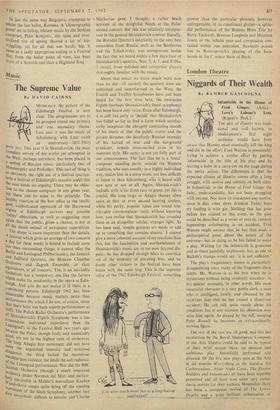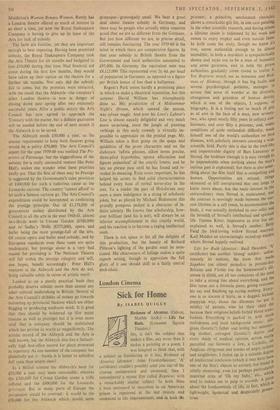London Theatre
Niggards of Their Wealth
By BAMBER GASCOIGNE Infanticide in the House of Fred Ginger. (Arts.)— Love's Labour's Lost. (Regent's Park.) THE plot of Hamlet was tradi- tional and well known, so trying to achieve a similar effect by putting `infanticide' in the title of his play and by leaving a baby in a carry-cot on the stage during the entire action: The differences is that the expected climax of Hamlet comes after a long struggle, with motive and subtlety on both sides. In Infanticide in the House of Fred Ginger the baby, understandably, has not been struggling with anyone. Nor have its murderers any motive, since it dies when three drunken Teddy boys try feeding it with gin. Nothing that has gone before has related to this event, so the play could be described as a series of entirely random happenings culminating in an accident. Fred Watson might answer that he has thus made a philosophical point about the nature of the universe—but in doing so he has failed to make a play. Waiting for the infanticide is gruesome and at times painfully unpleasant, but, as one of • Beckett's tramps would say, It is not sufficient.'
The play's fragmentary nature is particularly disappointing since many of the fragments show talent. Mr. Watson is at his best when he is mysterious without being stridently macabre- in his quieter moments, in other words. His most successful character is a Very gentle clerk, a man who is intelligent, lonely, and obsessed by the re,:iirrent fear that he has caused a disastrous accident. He can talk quite sanely about his condition, but at any moment his obsession may seize him again. As played by the tall, stooping Peter Russell he becomes an extraordinarily moving figure.
The rest of the cast are all good, and this last production by the Royal Shakespeare Company at the Arts Theatre could be said to be typical of their brief season there—an unusual and ambitious play, beautifUlly performed and directed. Of the five new plays seen at the Arts in six months (Everything _in the Garden, Nil Caborandum, Afore Night Conte, The Empire Builders and Infanticide) all have been superbly presented and all have won some very enthu- siastic notices for their authors. Meanwhile there has been a competent revival of The 1-41Wer Depths and a quite brilliant exhumation of Middleton's Women Beware Women. Rarely has a London theatre offered so much of interest in so short a time, yet now the Royal Shakespeare Company is having to give up its lease of the Arts for lack of subsidy.
The facts are familiar, yet they are important enough to bear repeating. Having been promised subsidy, the Royal Shakespeare Company took the Arts Theatre for six months and budgeted to lose £10,000 during that time. Had financial aid come during the first few months, they would have taken up their option on the theatre for a further six months. Not only did the subsidy fail to come, but the promises were retracted, with the result that the Aldwych—the company's other London theatre—is now in danger of closing down next spring after two extremely successful years. After a public outcry the Arts Council has now agreed to approach the Treasury with the matter, but a definite guarantee will be needed before the end of next month if the Aldwych is to be saved.
The Aldwych needs £50,000 a year, so the annual requirement to keep both theatres going would be a paltry £70,000. The Arts Council's report for the year 1959-60 was entitled The Pri- orities of Patronage, but the niggardliness of the subsidy for a really successful venture like Peter Hall's makes one wonder what these priorities really are. That the first of them may be Prestige is suggested by the Government's calm provision of £400,000 for such a ludicrous cause as the Leonardo cartoon. The country 'cannot afford' to let such a famous cartoon go. The Arts Council's expenditures could be interpreted as confirming the prestige principle. Out of £1,178,000 of government money distributed by the Arts Council to all the arts in the year 1960-61, almost two-thirds went to Covent Garden (£500,000) and to Sadler's Wells (£275,000), opera and ballet being the most prestige-full of the arts. Of course opera and ballet need subsidy, and by European standards even these sums are quite inadequate; but prestige alone is a very bad reason for providing it. The National Theatre will fall within the prestige category and will, one hopes, benefit accordingly: Peter Hall's ventures at the Aldwych and the Arts do not, being valuable solely in terms of artistic merit.
Looked at on a purely practical basis they probably deserve subsidy more than almost any other cultural undertaking in Britain. Several of the Arts Council's dribbles of money go towards bolstering up provincial theatres which are either flagging or producing mediocre work. It is good that they should be bolstered up (for many reasons as well as prestige) but it is even more
vital that a company should be maintained
which has proved its worth so magnificently. The artistic record of the Aldwych and the Arts is well known, but the Aldwych also has a fantasti- cally high box-utlice record for plays presented in repertory. As one member of the company has plaintively put it--Surely it is better to subsidise full seats than empty ones?
In a British context the Aldwych's need for £50,000 a year may seem reasonable, whereas
the £500,000 for Covent Garden seems a trifle inflated and the £400,000 for the Leonardo grotesque. But in many parts of Europe the perspective would be reversed: it would be the £50,000 for the Aldwych which would seem grotesque—grotesquely small. We hear a great deal about theatre subsidy in Germany, and there may be people who actually enjoy concrete proof that we are so different from the Germans. But just how different we are, in precise detail, still remains fascinating The year 1959-60 is the latest in which there are comparative figures. In that year subsidy to British theatre from the Government and local authorities amounted to £95,000. In Germany the equivalent sum was £8,125,000. This represented over 2s. 6d. per head of population in Germany, as opposed to a figure per British bonce of less than a halfpenny.
Regent's Park seems hardly a promising place in which to make a theatrical reputation, but this summer David William has triumphantly done so. His production of A Midsummer Night's Dream, which opened the season, was sylvan magic. And now his Love's Labour's Lost is almost equally delightful and very much more surprising, since the jungle of punning verbiage in this early comedy is virtually im- possible to appreciate on the printed page. Mr. William takes a firm grasp on the quips and quiddities of the prose characters and on the elaborate 'taffeta phrases, silken terms precise, three-piled hyperboles, spruce affectation and figures pedantical' of the courtly lovers; and he lets no phrase pass until he has found and re- vealed its meaning. Even more important, he has helped his actors to find solid characterisation behind every bout of verbal horse-play in the text. To a reader the part of Holofernes may seem a mere indulgence in a string of scholastic jokes, but as played by Michael Blakemore this proudly pompous pedant is a character of in- finite subtlety. He knows that scholarship, how- ever brilliant (and his is not), will always be an inferior accomplishment in this courtly world, and his reaction is to become a raging intellectual snob.
There is not space to list all the delights of this production, but the beauty of. Richard Pilbrow's lighting of the garden must be men- tioned. His chiaroscuro of foliage makes a quite superb setting, though to appreciate the full glory of it one should shift to a fairly central deck-chair.



































 Previous page
Previous page